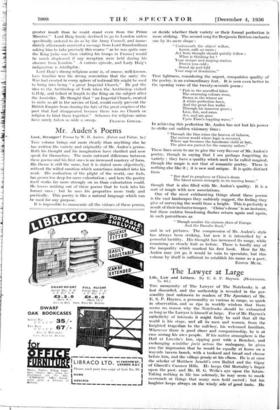Mr. Auden's Poems
r- Look, Stranger! Poems by W. H. Auden. (Faber and Faber. 5s.) Tiffs volume brings out more clearly than anything else he has written the variety and originality of Mr. Auden's genius. Both his thought and his imagination have clarified and now speak for themselves. The main outward difference between these poems and his first ones is an increased mastery of form. His theme is still the same, but it is stated more objectively, without the willed emotion which sometimes intruded into his work. His realisation of the plight of the world, one feels, has grown too deep for mere exhortation ; and here the poetry itself works far more strongly on us than exhortation could.- He leaves nothing out of these poems that he took into his former ones ; but he uses his properties more truly and poetically. This poetry is like a natural language which can be used for any purpose.
It is impossible to enumerate all the virtues of these poems, or decide whether their variety or their formal perfection is more striking. The second song for Benjamin Britten enchants one by its mere shape :
" Underneath the abject willow,
Lover, sulk no more Act from thought should quickly follow : What is thinking for ? Your unique and moping station Proves you cold ; Stand up and fold Your map of desolation."
That lightness, considering the urgent, compulsive quality of the poetry, is an extraordinary feat. It is seen even better in the opening verse of the twenty-seventh poem :
" Fish in the unruffled lakes The swarming colours wear, Swans in the winter air A white perfection have, And the great lion walks Through his innocent grove ; Lion, fish, and swan
Act, and are gone
Upon Time's toppling wave."
In achieving this perfection Mr. Auden has not lost his power to strike out sudden visionary lines :
" Through the blue irises the heaven of failures, The mirror world where logic is reversed, Where age becomes the handsome child at last, The glass sea parted for the country sailors."
These lines seem to me to give the very flavour of Mr. Auden's poetry, though in saying that I am perhaps forgetting its variety ; they have a quality which used to be called magical,
though the magic is not that of romantic poetry. There is nothing else like it ; it is new and unique. It is quite distinct from " But deaf to prophecy or China's drum The blood moves strangely in its moving home," though that is also filled with Mr. Auden's quality. It is a sort of magic with new associations.
One of the most exhilarating things about these poems is the vast landscapes they suddenly suggest, the feeling they give of surveying the world from a height. This is probably a result of their inclusive temper. ' China's drum' is an instance, but these sudden broadening flashes return again and again, in such parentheses as " Though sombre the sixteen skies of Europe And the Danube flood," and in set pictures. The compression of Mr. Auden's style has always been striking, but now it is intensified by a powerful lucidity. His thought has increased its range, while remaining as closely knit as before. There is hardly any of the inequality which - marked his first book. How far Mr.
Auden may yet go, it would be vain to speculate, but this volume by itself is sufficient to establish his name as a poet.
EDWIN MUIR.




















































 Previous page
Previous page